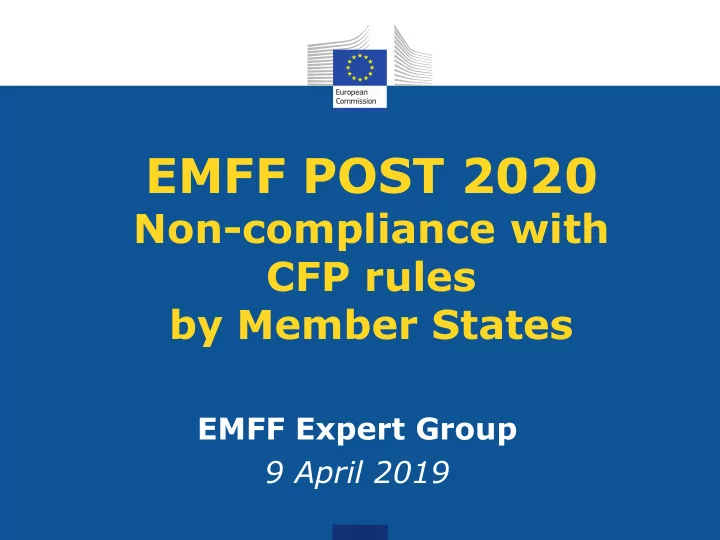

EMFF POST 2020 Non-compliance with CFP rules by Member States EMFF Expert Group 9 April 2019
Why a conditional approach for the EMFF? • In order to ensure continuity and transition between programming periods, as this already exists in the current EMFF! • The EMFF impact-assessment showed that, for stakeholders , a conditional approach to any future spending should continue to be linked to the delivery of CFP objectives. • This principle is also included in the CFP Regulation 1380/2013 , which lays down in its Art. 41 that “Union financial assistance to Member States shall be conditional upon compliance with the CFP rules by Member States” .
What might be the consequences for the EMFF funds? There might be 3 different and consecutive consequences on EMFF Funds. They can be resumed in the 3 following steps: 1) interruption of the payment deadline; 2) suspension of payments; 3) financial correction by the Commission . These 3 steps are the same as in the current period .
Step 1: The interruption of the payment deadline: why, when and how (1/2)? WHY? The interruption of the payment deadline is foreseen • in Art. 90 of the CPR in case of a serious deficiency or when additional verifications are needed . Art. 33 of the EMFF Proposal adds to this list the cases • of evidence of non-compliance by a Member State with CFP rules, if this may affect payments claimed. IN WHICH CASES? As in the current EMFF, COM will prepare a delegated • act listing these cases of non-compliance to CFP rules that may trigger the interruption of the payment deadline.
Step 1. The interruption of the payment deadline: why, when and how (2/2)? HOW ( Art. 90 of CPR and 33 of EMFF proposals )? • COM must inform the Member State which shall be able to present its observations. • The interruption is done through an interruption letter signed by the Authorising Officer by Delegation. • The interruption is of 6 months maximum. It may be extended by 3 months if the Member State agrees. • A Commission Decision is no more necessary to interrupt funds.
Step 2. The suspension of payments: when and how? (1/2) WHEN? In case of serious non-compliance to CFP rules. COM intends to propose the same definition as in the current EMFF (i.e. a case of non-compliance for which the situation was not remedied during the interruption period ).
Step 2: The suspension of payments: when and how? (2/2) HOW? ( Art. 91 of CPR and 34 of EMFF proposals ) • The procedure is nearly the same as in the current period. • After having given the Member State the opportunity to present its observations . • Through an implementing act . • The suspension will concern only the expenditure affected by the serious non- compliance. • It shall be proportionate, having regard to the nature, gravity, duration and repetition of the serious non-compliance.
Step 3: Financial correction by the Commission: when and how? (1/2) WHEN? • In case of serious non-compliance for which the Member State has not taken remedial action during the suspension period. HOW ? ( Art. 98 of CPR and 36 of EMFF proposals ) • The procedure is nearly the same procedure as in the current programming period. • After having given the Member State the opportunity to present its observations . • Through an implementing act making financing corrections by cancelling all or part of the Union contribution .
Step 3: Financial correction by the Commission: when and how? (2/2) • The amount of the correction shall take into account the nature, gravity, duration and repetition of the serious non-compliance. • In case the amount cannot be quantified, a flat rate or an extrapolated financial correction will be applied in accordance with delegated acts to be adopted. • If the Member State agrees to the financial correction and if the correction is not linked to irregularity, the Member State may reuse the amounts concerned, but not for an operation that was subject to that correction.
New delegated acts to be prepared • A delegated act defining the cases of non- compliance and the cases of serious non- compliance that may lead to an interruption or suspension of payments. • A delegated act determining the criteria for establishing the level of financial correction and for applying flat rate financial corrections .
Thank you for your attention! Do you have questions?
Recommend
More recommend